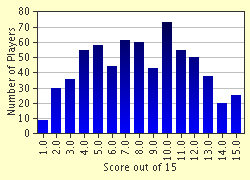Quiz Answer Key and Fun Facts
1. Miss Polly Nomial decided to build a water slide in the shape of the graph of her favourite polynomial function. She asked her chief architect if this was a good idea, what did he say?
2. One of Polly's favourite things to do is to go down the slide in the park; she likes it because it has constant (non-zero) slope. What sort of polynomial function is the slide?
3. Polly's cousin, Connie Conic, came over for a visit. She brought with her one of her favourite conic sections. As it turned out, Polly had the same shape in her polynomial functions collection! What conic would this be?
4. Polly's favourite song is "Holding out for a Zero" by Tonnie Byler. In Polynomial Land, zeros are VERY important. One of Polly's polynomial functions has degree 5. What is the MAXIMUM number of zeros her function can have?
5. Polly's little sister, Mono Nomial, has a degree 4 function as a pet. What is the MINIMUM number of real zeros her function can have?
6. If you listen to the lyrics of "Holding out for a Zero", Tonnie will tell you how to determine if a given number (say "a") is a zero of a given polynomial function (say "p(x)"). What will Tonnie tell you?
7. Sometimes, Polly only cares about finding the rational roots to one of her functions. She has one such function now, all with integral coefficients, of the form y = ax^n+bx^(n-1)+...+c, where c is not zero. Which of the following could NOT be a possible rational root of this function?
8. On rainy Sunday afternoons, Polly spends her time factoring polynomials. She is working on one such polynomial now, p(x). Using the Rational Root Theorem, she has determined that p(-2/3) = 0. According to the Factor Theorem, which of the following is a factor of p(x)?
9. Polly was #1 in her calculus class. She knows that if a polynomial function has a constant second derivative, and that second derivative is positive, then the graph of the function is always:
10. Polly has a polynomial function greater than degree 2, p(x), and she knows that there is a number "c" such that p'(c)=0 (the first derivative of the function evaluated at c equals zero) BUT p(c) is NOT zero. What does Polly know about the graph of p(x) for sure?
11. Polly is skipping rope with two of her best friends, Max and Min. She notices that the shape of the skipping rope is like a polynomial function, with Max (at one end) at the point "a" and Min (holding the other end of the rope) at the point "b". Max and Min are holding the rope at the same height, so if the rope was the function p(x) that means p(a)=p(b). "I'm on a Rolle!" screamed Polly. What can we say about p(x) in the interval (a,b)?
12. Polly knows there are many different theorems that tell us many beautiful things about polynomial functions. One such theorem says, on an interval (a,b), there will ALWAYS be some number "c" such that p'(c) = p(b)-p(a)/b-a. Polly likes the result of this theorem, despite the fact that this theorem can be "nasty". Which theorem is this?
13. Polly likes solving polynomial equations like p(x)=0. For quadratic equations, she solves them by completing the square. For cubic and quartic (degree 3 and degree 4, respectively) equations, she tries other methods - if those fail, she can always rely on certain formulas to find the roots for her. Can she use a formula to find the roots of a quintic (degree 5) polynomial?
14. Polly has bad dreams sometimes after she eats too much Mexican food right before bedtime. One of her scariest goes like this: she is taking her favourite polynomial function (degree n) out for a walk, and she runs into the big bad differential operator, who threatens to differentiate her pet function until it is 0. How many times would the operator have to differentiate Polly's function to make the function 0?
15. Polly loves her life; the world of polynomial functions is a happy place where all children can play together, regardless of what colour or religion they are. This was decreed by King Riemann. Unfortunately, not all function families are like this. To what function operation am I referring?
Source: Author
Mrs_Seizmagraff
This quiz was reviewed by FunTrivia editor
crisw before going online.
Any errors found in FunTrivia content are routinely corrected through our feedback system.


